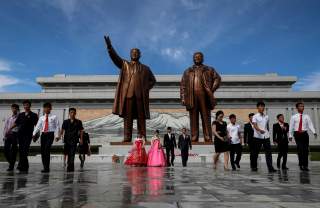The Hanoi Summit – We Asked Daniel L. Davis What Happens Next in U.S.-North Korea Relations
"Attention to fundamentals, instead of parsing the minutiae of this drama, makes clear that our overriding imperative is the security of the United States and the preservation of our ability to prosper as a nation."
Editor’s Note: Looking for more opinions on where we go after the Hanoi summit? Check out all 80 expert takes on where U.S-North Korea relations go next here.
Before evaluating the outcomes from the second Trump-Kim summit in Hanoi, it’s critical to understand what is at stake and how diplomacy works. The United States is currently safe vis-à-vis North Korea because of our overwhelming military strength—our conventional and nuclear deterrent capabilities already deter far greater powers, like China. When it comes to diplomacy, progress rarely comes quickly. And with North Korea, its entire history has been spent at war, literally, with the United States; that’s why trust-building is paramount. So the right question to ask is: Did the Hanoi summit contribute to an ongoing process that will build trust between our nations, make peace more possible, and open North Korea (and its people) to the world?
By that standard—not the unrealistic, if not impossible, standard of near-term denuclearization prevalent throughout Washington—the summit was, in fact, productive in achieving progress toward positive outcomes beyond our already-guaranteed security.
Attention to fundamentals, instead of parsing the minutiae of this drama, makes clear that our overriding imperative is the security of the United States and the preservation of our ability to prosper as a nation. And if that is the true objective, we are already in a very strong position. Two core considerations illustrate this well.
First, America’s overwhelming conventional and nuclear military deterrence is much more powerful than anything North Korea has or can acquire. It essentially guarantees Kim will never launch an unprovoked attack against our country or our ally, South Korea.
Second, while Kim is a brutal dictator, he is rational. His behavior for the past eighteen months especially has shown he desires to build his country’s prosperity and establish a long reign in Pyongyang. That gives the United States, South Korea, and the world leverage. Starting a war he cannot win will not help Kim in either goal, so we can remain confident he is contained.
The ramifications of those two factors are considerable and should be kept at the forefront of our thinking. Together, they mean time is on our side. The security of the United States is not threatened by North Korea because Kim knows, correctly, that any attack against us would unquestionably result in his destruction. With his predecessors, Kim Il-sung and Kim Jong-il, Kim has been successfully deterred from a first strike attack for years, and the Kim regime will continue to be subject to the same deterrence dynamic indefinitely.
Though some claim deterrence won’t work on Kim because he is uniquely brutal and doesn’t value human life—and thus we may one day have to use military force if he doesn’t fully comply with our CVID demands—the evidence suggests otherwise.
Kim has reportedly killed scores of domestic political opponents of his rule and has locked more than one hundred thousand North Koreans in political gulags. That cruelty must not be minimized, but it should be put in historical context. China’s Mao Tse Tung is estimated to be responsible for the deaths of at least forty-five million of his own people during his rule. Mao was armed with nuclear weapons and willing to send three hundred thousand Chinese troops to battle the American military in the Korean War. Nevertheless, he was successfully deterred from attacking the United States. If Mao can be deterred, Kim—a much weaker dictator with far fewer resources available to him—can certainly be deterred as well.
Likewise, the Soviet Union’s Joseph Stalin, arguably the most brutal and murderous dictator of all, controlled a massive nuclear arsenal and did not value any human life. He too was deterred from ever attacking America. Compared to these monsters of history, Kim’s tinpot tyranny ceases to look like an unparalleled threat.
The best way forward is to continue deterring North Korea, support continued productive engagement and all moves toward peace—especially negotiations between Seoul and Pyongyang—and continue working on the diplomatic front to open North Korea and minimize the threat of war. This—not a reckless and unrealistic obsession with CVID—is how the United States can achieve positive outcomes on other issues, like human rights abuses, along with our access to economic opportunity throughout Asia.
Daniel L. Davis is a senior fellow for Defense Priorities and a former lieutenant colonel in the U.S. Army who retired in 2015 after twenty-one years, including four combat deployments. Follow him @DanielLDavis1.
Image: Reuters

